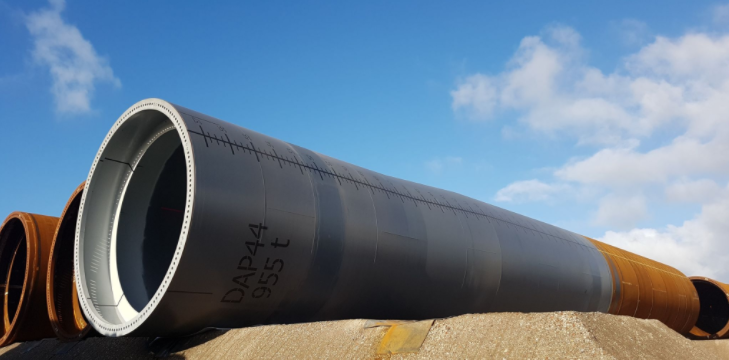
According to information shared by Seaway7 two months ago and AIS data available online, Seaway Strashnov was in Brest, France, for planned maintenance until early March.
The vessel will now continue installing monopile foundations at Dogger Bank A until approximately the third quarter of this year and will be installing monopiles only.
Manufactured by the Sif-Smulders consortium, the monopile foundations are being dispatched from Sif’s Maasvlakte 2 Rotterdam terminal in the Netherlands.
Over the three-year installation programme for the three phases of Dogger Bank Wind Farm, a total of 277 monopiles and transition pieces will be loaded onto installation vessels in Rotterdam ahead of transfer out to the offshore wind farm site, located some 130 kilometres off the UK coast.
The foundations at Dogger Bank A will support 95 GE Haliade-X 13 MW offshore wind turbines, whose installation is also scheduled to start soon.
Meanwhile, the crane vessel Thialf, which recently arrived at the offshore project site from its previous work in the Baltic Sea, has been deployed for the installation of the two offshore substations for Dogger Bank A and Dogger Bank B.
The vessel has now installed the jacket foundation for the first substation, the one at the Dogger Bank A site, and will now install its topside, which Aibel sent off from its yard in Haugesund, Norway, on 16 March.
Around 21 April, Thialf will start installing the jacket foundation for the Dogger Bank B offshore substation and is expected to install the entire substation for the second phase of Dogger Bank Wind Farm by 1 May.
The 3.6 GW, three-phase Dogger Bank Wind Farm is the world’s largest offshore wind farm under construction.
Once up and running in 2026, the project, owned by a joint venture between SSE Renewables (40 per cent), Equinor (40 per cent), and Vårgrønn (20 per cent), will be providing enough electricity to power roughly six million UK homes a year.